Hunting Dog Training From Smith Kennels & Right Start Kennels

BACK TO SCHOOL
Every year, thousands of hunting dogs go to professional trainers across the country. Many are puppies – youngsters full of promise and potential. Some are veteran sporting dogs that need a tune-up, or a total makeover. Some go away for weeks, some for months. Many come home well-trained and stay well-trained. Some don’t.
Choosing the right trainer, at the right time, with the right preparation can help make good dogs great and pay dividends for life, according to experts at two renowned training kennels.
Smith Kennels has been a force in the bird dog world for decades. Founded in 1956 by the late Ronnie Smith Sr., and now operated by the husband-and-wife team and veteran trainers Ronnie Smith Jr. and Susanna Love Smith, Smith Kennels takes in dogs from across the country and works to build confident, proficient bird dogs that consistently perform in the field. Ronnie’s uncle is legendary trainer and Bird Dog Hall-of-Famer Delmar Smith. Ronnie has run guiding operations on the 6666 Ranch, divisions of the King Ranch, and has even guided U.S. Presidents. He took over Smith Kennels in 1982 after his father passed away and was joined by Susanna in 2006. Susanna is a fourth generation West Texas rancher who grew up training horses and bird dogs. Together, the Smiths moved the operation from Big Cabin, Oklahoma to a new facility near Pawhuska, Oklahoma, and continue the family tradition.
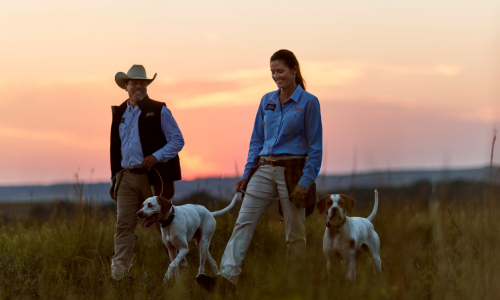
“Our number one goal is to build better bird dogs,” Ronnie Smith says. “Going to school – so to speak – and having formal training can help teach dogs to learn how to learn.”
Susanna Love Smith says owners should have an end-goal in mind before they send a dog to a trainer. “We strive to train a dog that an owner can take anywhere, in any environment, and be successful.”
Since 1990, Jim Van Engen and his Wisconsin-based Right Start Kennel has specialized in taking young retrievers through basic training and preparing them for advanced training and competition. Jim estimates he’s trained more than 1,500 dogs, including the foundation for nearly 200 AKC Field Champions with 13 of those dogs earning a total of 16 National Championships. A former high school teacher, Jim’s training philosophy is to develop a dog to its full potential – whether competing in field trials, hunt tests or as a gun dog and hunting companion – within a structured, progressive training program.
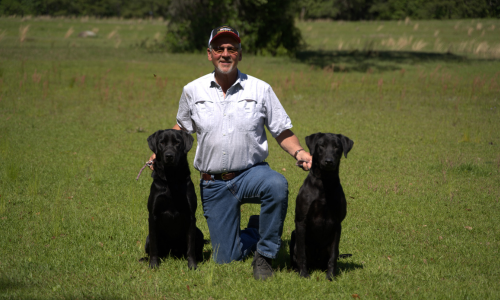
Jim says pre-school starts when the owner brings a new puppy home.
“Teach your dog to be a good citizen starting at seven- to eight-weeks,” Jim says. “Expose them to people. Take them everywhere. Establish boundaries. Let them know what they can and can’t do. When owners take time to teach dogs how to learn at a young age, those dogs tend to breeze through our program.”
FIRST, DO YOUR HOMEWORK
Finding the right kennel, and the right trainer takes time, effort, and research.
“The baseline for a kennel is it must be safe, clean and well-maintained,” Susanna says. “The trainer needs to be somebody you can relate to and have a dialogue with. You need to be able to talk to and learn from that trainer in a format you can understand and communicate to your dog for the rest of its life.”
Jim Van Engen agrees and advocates visiting the facility – multiple times if possible – depending on its proximity to the owner.
“I also want to see the dogs they are training or running,” Jim says. “Do they look stylish, or scared?”
Jim says the health and welfare of dogs in a trainer’s care are paramount.
“Do the dogs look healthy? Are they in good shape? Diet is a key factor in the health of these athletes and we feed top quality Purina Pro Plan Performance dog food.”
Jim also recommends finding and talking with other owners who have had dogs trained at the facility. “Word of mouth can be helpful. What was their experience? Were they pleased with the results? At the same time, you can do your own research. If the trainer runs field trials, do some of the dogs place? If the trainer runs hunt tests, do they pass?”
Another important consideration when choosing a kennel is access to good training grounds.
The Smiths’ Prairie Hills Ranch and the rolling hills of Osage County, Oklahoma enable Ronnie and Susanna to literally walk out the door and go to work. Likewise, Jim strives to find the best training areas and works with his retriever pro colleagues to share training grounds and provide a mix of land and water opportunities. “I want to make sure my dogs are seeing everything and getting exposed to everything they might encounter at a field trial or a hunt test or during an actual hunt.”
TIME TO SEEK PROFESSIONAL HELP?
Ronnie Smith looks for two things in a bird dog: “One: a dog that is so well-socialized that it can mitigate stressors, adapt, and move forward. That’s something that carries on throughout life and will help him or her in any environment. Two: a dog that has a high prey drive – a desire for game. That will help sustain him or her throughout the training process.”
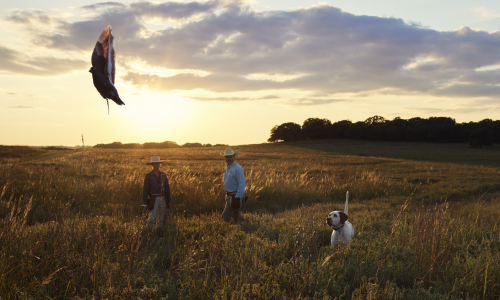
For dogs with little to no experience on game birds, the Smiths offer a two-week Field Introduction class that builds desire to hunt and introduces dogs to elements of the field. Dogs can be as young as four months to participate, but mature dogs that lack experience are encouraged as well.
Next, the 90-day Basic Formal Training class teaches dogs the foundational skills every bird dog should know.
“We call these our Core Behaviors,” Ronnie says. “Bird dogs need to go with you, come to you and be still or stand still.”
When is a dog ready for formal training?
“We like it when dogs are mentally and physically mature enough for our Basic Formal Training class. That’s typically around 1 year of age for bird dogs. But it depends on the dog.”
At Right Start Kennel, Jim says most retrievers come in for basics training at about six months.
Jim recommends dogs have basic obedience and lots of socialization.
“Ideally, we want a retriever puppy to know its name, understand the word ‘no’, come when called and sit and heel on command. A lot of how long they stay here in training depends on what owners have done before I get them,” Jim says. “The majority of my field trial dogs are with me for 18 months and up to 2 years. Hunting dogs are typically in training for about three months. If you’ve done nothing with them, you’re going to pay for another month!”
Jim laughs and gives an example. “I was a high school teacher. The kids who were wild – kids whose parents allowed them to run wild – were a lot harder to teach. Same with dogs. I’ve had clients bring dogs over and say ‘Oh don’t let him loose – we’ll never catch him.’ That dog will probably need some extra time and attention in training.
“I’ve also had people say, ‘I didn’t do anything with the dog because I didn’t want to make a mistake.’ Well, that’s your first mistake.”
Ronnie says training is relationship-based and owners should be aware of how they impact a dog.
“Your dog is a reflection of what you allow and condone,” Ronnie says. “We don’t have a relationship with that dog when they come here for training. We establish it.”
One of Smith Kennels’ themes for 2024 is training owners not to teach with words. It’s part of a decades-old training philosophy perfected by the Smith family and known as “The Silent Command System.”
“Bird dogs live their world based on body language,” Ronnie says. “Most of the talking, the baby talk, is for us humans. They’re trying to teach the animal English. If you can teach a behavior without talking, then you’re actually training. When you can put your hands on a dog in a positive way and instill confidence, then you’re actually training. When you get the behavior you are training, then you can name it.”
IT PAYS TO PLAN AHEAD
Good trainers and top-notch facilities may be full and typically have a waiting list. Owners need to start looking for a training kennel when – if not before – the puppy is whelped.
“At Smith Kennels, we start accepting reservations about a year in advance,” Susanna says. “We think it’s a good idea to start thinking about where you want to send that dog for training when you get that dog as a puppy. That allows you to prepare and develop that puppy for training in a way that aligns with the trainer’s program.”
She adds that sometimes last-minute openings occur, so keep in touch with the prospective trainer.
Jim Van Engen is retiring this year but also emphasizes lining up training options well in advance.
“Ask questions including two big ones – how many dogs do they have in training and what kind of help do they have? At Right Start Kennel, we restricted it to 24 dogs. My brother Brian has been helping me for 25 years. I know how many dogs we can get done in a day. When the number of dogs goes up, the quality typically goes down.”
The Smiths agree and figure a maximum of 15 dogs per trainer.
“Between Ronnie and I we do not accept more than 30 dogs per class,” Susanna says. “We actually prefer 24 to 25 per class.”
SCHOOL’S OUT
After several months of training, it’s time to go get your dog.
“The hand-over is so important,” Ronnie says. “The trainer who just opens the gate and hands you your dog is not the trainer you’re looking for. We want owners to call us and check in to make sure we’re all on the same page. And we ask owners to spend time with us to go over the training and learn how to manage the dog. If you don’t spend time learning and working with your trainer, if you don’t learn the cadence, the timing, the commands – eventually all that training will erode.”
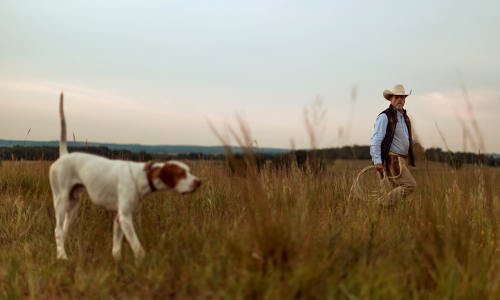
Susanna adds, “Dogs aren’t like computers. You can’t program them, and training doesn’t program them for life. Training gives dogs education that can be used or forgotten in short order.”
Jim Van Engen encourages clients to participate in training sessions.
“I do tell them to stay away for the first month when we’re getting to know the dog – after that, come as much as you like,” Jim says. “It’s important that clients come and be with us. You need to learn what we do and why we do it. And you need to know the commands and be consistent.”
FIXING A HOLE
Even with solid training and a good hand-off, many dogs tend to revert to old or bad habits upon returning home or during the off-season.
“As professional trainers, we call this job security,” Jim says and laughs. “Dogs are so smart. They know what they can get away with – especially if you’re not consistent or relax your standards.”
For retrievers, it might be steadiness issues or “creeping” before being sent for a retrieve, or simply ignoring commands and basic obedience.
“I’m a big fan of tune-ups,” Jim says. “We have dogs come back and often within two or three days we have them right back where they need to be. It’s kind of funny, the dogs get here and think, ‘Oh boy, that’s Jim. We have to listen again. They have rules here.’ “
The Smiths offer an Annual Tune-Up class for existing clients. The month-long class is typically scheduled for September.
“It’s an opportunity to put some polish on that training and prepare dogs mentally and physically for the upcoming hunting season,” Susanna says.
FOOD FOR THOUGHT
Like Jim Van Engen, Ronnie and Susanna Smith are longtime proponents of Purina.
“We’ve found that across the board, Purina Pro Plan is a food that performs consistently for all breeds of bird dogs during reproduction, growth, training, and under the rigorous demands of field trials and professionally guided hunts,” Ronnie says.
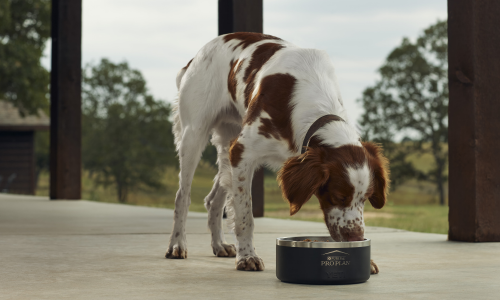
Susanna says preparing a bird dog to go away to school for training can include teaching your dog to eat.
Ad lib feeding – leaving kibble out for grazing and consumption throughout the day – isn’t practical at training kennels and typically doesn’t work.
“That means teaching your dog to eat a full serving of food once a day in a 15-minute window,” she says. “Dogs that are in training or traveling or hunting multiple days can get the nutrition and calories they need to perform to their full potential.”
Feeding time at kennels is part of an efficient daily routine. Each dog receives the appropriate ration, consumes it, and then has time to air and eliminate.
That routine translates to the field. Dogs hunt hard, cool down, and are fed a meal at the end of the day to refill the gas tank.
“Dogs learn and adapt very quickly,” Susanna says.
EARN EXTRA CREDIT – ATTEND A SEMINAR
A great bang for the buck happens almost every weekend around the country. Talented sporting dog trainers – often in conjunction with clubs or associations – offer day or weekend seminars that cater to beginners and professionals.
“In addition to learning about the trainer and training techniques, a seminar is a great opportunity to see a lot of different breeds of bird dogs and a lot of training situations in real time,” Ronnie Smith says. “You’ll see more dogs in a weekend than you’ll probably own in your lifetime.”
Ronnie adds that seminars are not only beneficial for working with your current dog, but also can help owners in selecting for future dogs, including the breed, the breeder, or the trainer.
OLD SCHOOL
Another way to accelerate the learning curve is by tapping into training resources, including books and DVDs.
Delmar Smith once said, “If you want to train like a pro, you’ve got to think like a dog.”
The knowledge, wisdom and experience of old and new dog trainers are captured in hundreds of classic books, DVDs and now – conveniently packaged as digital and on-line content.
Jim Van Engen is retiring, but aspiring retriever enthusiasts can still tap into his 48 years of dog training experience by watching his “Right Start Your Retriever” DVD. The two-hour DVD focuses on taking young dogs and progressing from 7 weeks to 7 months.
“It is rewarding to see dogs develop and progress,” Jim says. “I still like it a lot after 48 years.”
For more information about Smith Kennels, go to www.smithkennels.com
For more information about Right Start Kennel, go to www.rightstartkennel.com